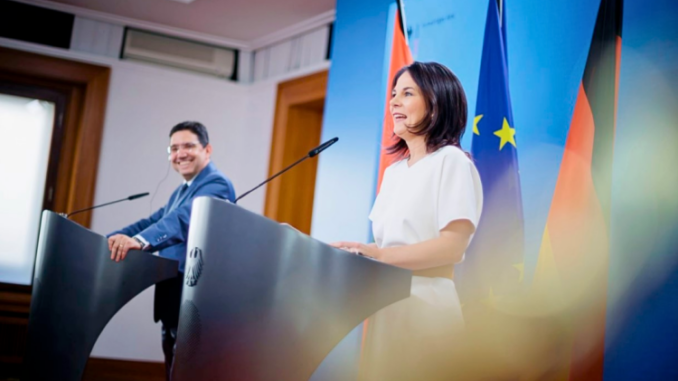
Germany commended the social and economic reforms carried out by Morocco, and the kingdom’s active contribution to regional peace and stability under the leadership of King Mohammed VI, and said it is closely following the royal initiative meant to enable Sahel States access the Atlantic Ocean.
Germany welcomed “the reforms carried out by Morocco, under the leadership of HM King Mohammed VI, for a more open and dynamic Moroccan society and economy,” states a joint declaration adopted in Berlin on Friday by the 1st session of the multidimensional strategic dialogue, co-chaired by German Foreign Minister Annalena Baerbock, and her Moroccan peer Nasser Bourita.
In the Declaration, Germany also praised Morocco’s active and constructive role and contribution to peace and stability in the region.
In this vein, Berlin reaffirmed Germany’s vision of Morocco as an essential partner of the European Union, NATO, and Germany in Africa, and a crucial link between North and South.
Germany also indicated that it was closely following the initiatives launched by King Mohammed VI for the African continent, including the Royal initiative meant to enable Atlantic Ocean access for Sahel States.
Germany is “closely following the initiatives launched by HM King Mohammed VI for the African continent, including that of November 6, 2023 for the Sahel region” aimed at facilitating access to the Atlantic Ocean for the countries of the region, underlines the joint declaration
The German foreign minister also reiterated her country’s support for Morocco’s autonomy plan as “a serious and credible effort by Morocco and as a good basis for a solution” to the Sahara issue.
At the end of this first session of the Dialogue, the two officials reaffirmed at a joint news conference their shared interest in pursuing the implementation of the Joint Declaration and strengthening the multi-faceted partnership in all policy areas.
They also reaffirmed their desire to further develop bilateral economic and trade relations, and encouraged economic players to join in the endeavor, underlining Morocco’s significant investment potential, as highlighted by the Moroccan Investment Charter.
In the field of migration cooperation, the two foreign ministers expressed their support for the work of the bilateral Joint Migration Group, which held its inaugural session on January 23, 2024, and welcomed the regular working meetings.
They agreed that reducing irregular migration is a common challenge and requires a comprehensive approach, guaranteeing international human rights standards. They thus agreed to continue improving professional mobility, legal migration, return, readmission, and reintegration.
In terms of security cooperation, they welcomed the joint declaration signed by the Interior Ministers on October 31, 2023, aimed at resuming cooperation in all areas of domestic policy.
They stressed their shared ambition to deepen dialogue to tackle terrorism and other security challenges together, notably within the Global Coalition against Daesh and the Global Counterterrorism Forum.
The two countries reaffirmed their will to advocate an ambitious international commitment to combat the effects of climate change, encourage actions in favor of the mitigation of these effects, and accelerate a just energy transition, reads the joint declaration.
Later in the day, Morocco and Germany signed a climate and energy alliance that includes cooperation in green hydrogen, to which Morocco attaches utmost importance in its energy diversification plans and which is key to Germany’s goal to reach carbon neutrality by 2045.
The alliance was signed by Foreign minister Nasser Bourita and German Development Minister Svenja Schulze in Berlin.
The Multidimensional Strategic Dialogue was also a chance to highlight cooperation prospects in legal migration, women empowerment, education, and African development.
Particular emphasis was also placed on promoting regional and international peace and security, and strengthening multilateral institutions.
The Multidimensional Strategic Dialogue is held once every two years, alternately in Morocco and Germany, and is chaired by the Foreign Ministers of both countries.
